The Desiderius Erasmus Collection (17 vols.)
Digital Logos Edition
Overview
One of the most important figures of the 16th century, Desiderius Erasmus was a leading reformist and Renaissance humanist. Through his works and letters, Erasmus championed that true religion was a matter of inward devotion rather than outward symbols of ceremony and ritual, and sought to reform aspects of the Church from within. His works showed an astonishing intelligence, razor-sharp wit, and an authentic love for God and humanity. Soon after publication, his works were translated and read all over Europe.
The Desiderius Erasmus Collection (17 vols.) contains all of Erasmus' major works and more. In Praise of Folly, one of Erasmus' best-known books, is considered one of the most notable works of the Renaissance humanists. Against War and The Complaint of Peace still hold their own as some of the best Christian anti-violence literature written. The Colloquies of Erasmus is satire at its finest—funny, inspiring, rich with knowledge, poignant, captivating, and entertaining. And Francis Morgan Nichols' 3-volume anthology of Erasmus' letters show the depth and compassion of a man who's influence would change the world forever.
The Desiderius Erasmus Collection (17 vols.) also includes Erasmus' Proverbs Chiefly Taken from the Adagia of Erasmus, and Education of a Christian Prince, considered by many to be the antitheses to Machiavelli’s The Prince.
All these important works, and more, including a biography and a volume that explores the rift between Erasmus and Luther in-depth, are tagged and appear on mouse-over. What’s more, Scripture references are linked to the wealth of language resources in Logos. This makes these texts more powerful and easier to access than ever before. With the advanced search features of Logos Bible Software, you can perform powerful searches by topic or Scripture reference—finding, for example, every mention of “Reformation,” or “peace.”
- Key works that influenced the Reformation
- Contains Erasmus' collected letters
- In-depth biography of Erasmus included
- Over 5,000 searchable pages
Perhaps no man wielded a greater influence in the sixteenth century than Erasmus. Both in his relation to Protestantism and Romanism, Erasmus was an epoch-making personality. The modern age cannot be understood without a study of his writings and the tracing of his influence.
—The Reformed Church Review
Clearly the greatest and most prolific letter writer of his age, and arguably the finest epistolary artist of all time, Erasmus was master of the verbal craft. A master of humor, overstatement, invective, persuasion, comfort and praise, Erasmus was a virtuoso of the phrase well turned and of the argument well honed. He knew that the pen was mightier than the sword. Indeed, in his hand the pen was a sword—as well as a bludgeon and a warm embrace.
—Michael Bauman, Hillsdale College
To read Erasmus is to grow in wisdom.
—Journal of the Evangelical Theological Society
- Title: The Desiderius Erasmus Collection (17 vols.)
- Author: Desiderius Erasmus
- Volumes: 17
- Pages: 5,618
This title is included in the following collections
You can save when you purchase this product as part of a collection.
Philosophy Research Library (1...
$799.99$799.99Logos 6 Anglican Platinum Lega...
$1,499.99$1,499.99Logos 5 Anglican Platinum Lega...
$1,499.99$1,499.99Verbum 5 Platinum Legacy Libra...
$1,499.99$1,499.99
- $2,999.99
- $2,999.99
- $3,413.99
- $4,749.99
- $4,749.99
- $12,102.39$7,299.99
- $21,749.99
- $24,999.99

Erasmus begins his anti-war treatise with this quote from the poet Pindar: "Dulce Bellum Inexpertise," or, "war is sweet to those who have never experienced it." This beautifully crafted plea for peace includes a 49 page introduction by John W. Mackail.
We must not forget one of the greatest champions of light against the darkness, of peace against war, of the spirit against the letter, of comprehension against exclusion, of reason against dogma—Erasmus.
—Liberty Review
John W. Mackail is the author and editor of over thirty works, including the biography of William Morris, and is remembered most as a Virgil scholar.
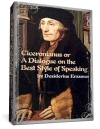
This satirical work attacks the school of thought that believed in a rigid use of Ciceronian Latin. Erasmus' witty critique of language, reading and writing, teaching methods, and what constitutes a proper education is written in a conversational, back-and-forth dialogue.
Few of the writings of Erasmus possess more pleasantness than the Ciceronianus.
—The Southern Review
Izora Scott, Ph.D., was instructor of Latin at Erasmus Hall High School in Brooklyn, N.Y. and a contributor to the Cyclopedia of Education on the works of Erasmus and Ciceronianism.
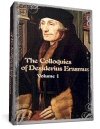
The Colloquies of Erasmus still hold interest to many—the linguist, the historian, the moralist, the theologian, the lover of fiction—the short ruminations that fill these pages are funny, inspiring, rich with knowledge, poignant, captivating, and entertaining. These works were in high demand when they were published, creating a sensation all over Europe and placing Erasmus on the short list of must-read Latin scholars. Volume one contains Bailey's Preface, a brief biography of Erasmus, and the following Colloquies:
- Courtesy in Saluting
- Family Discourse
- Of Rash Vows
- Of Benefice-Hunters
- Of a Soldier's Life
- The Commands of a Master
- The School-Master's Admonitions
- Of Various Plays
- The Child's Piety
- The Art of Hunting
- Scholastic Studies
- The Profane Feast
- The Religious Treat
- The Apotheosis of Capnio
- A Lover and Maiden
- The Virgin Averse to Matrimony
- The Pentitent Virgin
- The Uneasy Wife
- The Soldier and Carthusian
- Notes
Nathan Bailey was a philologist and lexicographer. His An Universal Etymological English Dictionary was the most widely used dictionary of the 18th century.
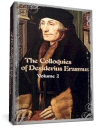
Volume 2 includes the following Colloquies:
- Philetymus and Pseudocheus
- The Shipwreck
- Diversoria
- The Young Man and Harlot
- The Poetical Feast
- An Enquiry Concerning Faith
- The Old Men's Dialogue
- The Franciscans, or Rich Beggars
- The Abbot and Learned Woman
- The Epithalamium of Petrus Ægidius
- The Exorcism or Apparition
- The Alchymist
- The Horse-Cheat
- The Beggars' Dialogue
- The Fabulous Feast
- The Lying-In Woman
- The Religious Pilgrimage
- Notes
Nathan Bailey was a philologist and lexicographer. His An Universal Etymological English Dictionary was the most widely used dictionary of the 18th century.
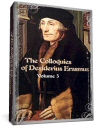
Volume 3 includes the following Colloquies:
- The Funeral
- The Echo
- The Unequal Feast
- Of Things and Words
- Charon
- The Assembly of Grammarians
- The Unequal Marriage
- The Imposture
- Cyclops, or the Gospel Carrier
- The Impertinents, or Cross-Purposes
- The False Knight
- The Play of Cock-All
- The Assembly or Parliament of Women
- Diluculum, or the Early Rising
- The Sober Feast
- The Notable Art
- The Sermon, or Merdardus
- The Lover of Glory
- Opulentia Sordida, or the Wealthy Miser
- The Seraphick Funeral
- Amicitia, or Friendship
- Problema, the Problems
- The Epicurean
- The Conflict between Thalia and Barbarism
- Concerning the Profitableness of Colloquies
- Of the Method of Study
- Notes
Nathan Bailey was a philologist and lexicographer. His An Universal Etymological English Dictionary was the most widely used dictionary of the 18th century.
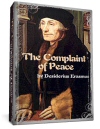
Erasmus' personification of Peace is upset with the state of the world, and believes man would be better off paying more attention to it. "At the nativity of Christ did the angels sound the clarion of war?" Filled with Erasmus' customary wit, this volume is as pertinent today as it was when it was first written.
An eloquent and sensible harangue against war.
—Southern Review
Thomas Paynell (1528–1567) was an Austin friar and educated at the College of St. Mary the Virgin, Oxford. He served as chaplain to Henry VIII, and despite the religious upheaval of the times, remained in good favor with Edward VI, Mary, and Elizabeth—all of which he dedicated books to.
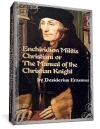
This is Erasmus' handbook for daily Christian living. Erasmus lays out the spiritual disciplines one needs to practice in order to obtain a fulfilling and faithful life. Erasmus warns of Christian formalism, of emphasizing the ritual and observance of Christianity without truly understanding the teachings of Christ.
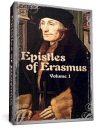
The Epistles of Erasmus, vol. 1 contains over two hundred letters from the approximate years 1493–1509, plus a detailed introduction, a chronological register of the letters, a table of correspondent's names, and five appendixes.
It offers an indispensable starting point for every future study of the great humanist.
—The Nation
Francis Morgan Nichols was born in 1826. Nichols was also the translator of works such as Britton, The Roman Forum, The Marvels of Rome, and The History of Dedham. He died in 1915.
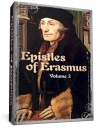
The Epistles of Erasmus, vol. 2 contains well over three hundred letters from the years 1509–1517, plus five appendixes.
This volume is full of good things, of sayings that linger in one's memory and do credit alike to the head and heart of Erasmus, and, above all things, glimpses into the literary life of Europe on the eve of the Reformation. Mr. Nichols has done his task in a way that will lay all scholars under lasting obligation. It is a monumental work.
—The London Quarterly Review
Francis Morgan Nichols was born in 1826. Nichols was also the translator of works such as Britton, The Roman Forum, The Marvels of Rome, and The History of Dedham. He died in 1915.
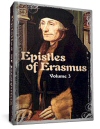
The Epistles of Erasmus, vol. 3 contains well over two hundred letters from the years 1517–1518 plus a detailed index.
Lovers of learning, and all such must be lovers of Erasmus, owe a great debt to the late Mr. Nichols.
—The English Historical Review
Francis Morgan Nichols was born in 1826. Nichols was also the translator of works such as Britton, The Roman Forum, The Marvels of Rome, and The History of Dedham. He died in 1915.
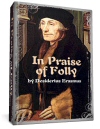
In Praise of Folly, Erasmus's best-known work, is considered one of the most notable works of the Renaissance humanists. His satirical lampooning of the traditions of European society, of the Catholic Church, and superstitions popular in his day sparked wide acclaim and wide condemnation—and sold far better than he anticipated. The work was quickly translated all over Europe, and was read for its humor, irony, rhetorical art, and statement of Christian ideals which Erasmus espoused.
We must not forget one of the greatest champions of light against the darkness, of peace against war, of the spirit against the letter, of comprehension against exclusion, of reason against dogma—Erasmus.
—Liberty Review
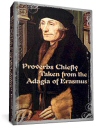
In the year 1500, at the age of thirty-three, Erasmus published his first collection of proverbs and their explanations, which he had found scattered in the early Greek and Roman writers. The work was received with such an enormous positive response that over his lifetime Erasmus would frequently update and reprint the Adagia with new additional proverbs, the last edition numbering over four thousand. Robert Bland provides the English translations from Latin, as well as providing corresponding examples in Spanish, Italian, and French.
Without Erasmus, no student of proverb literature can move a step.
—The London Quarterly Review
Robert Bland, M.D. (1730–1816) ran a successful practice in London as an obstetrician, and was the author of several medical books.
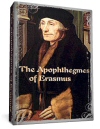
This collection of wise sayings and noble deeds from emperors, kings, captains, philosophers, and orators was originally published by Erasmus in 1542, and translated to English in 1564 by Nicolas Udall. Includes anecdotes and Erasmus' commentary on Socrates, Aristippus, Diogenes, Alexander the Great, Augustus Caesar, and more.
Nicolas Udall (1504–1556) was a playwright, cleric, schoolmaster, translator, and author of Ralph Roister Doister.
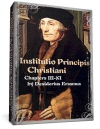
In Europe, as Erasmus saw it, war was almost invariably the result of pride, folly, and selfish intrigue, and he made it his task to point out how, by proper instruction at the earliest age, the Sovereign and his Councilors might be led to abhor what was plainly the worst of all human calamities. Often considered the antithesis to Machiavelli’s The Prince (which was written only sixteen years later), Education of a Christian Prince argues in favor of a leader that rules justly and benevolently as opposed to Machiavelli’s advice for ruling with fear and oppression to maintain power.
The reasons which justify the great efforts for peace being made in the world today are broadly the same as those urged by Erasmus four centuries ago, and the is much in the Institutio Principis, and in his other utterances on peace, that is neither trite nor of merely historical interest. Modern peace movements take the direction of international organizations, but there is still much to be said for the thesis, which formed the basis of Erasmus' work on the subject, that war can only be finally eliminated by the reform of "human nature."
—Percy Ellwood Corbett, from the Introduction
Percy Ellwood Corbett (1892–1983) received his M.A. in 1915 and then volunteered to serve as an officer in the Canadian Expeditionary Force in France, where he was severely wounded and awarded the Military Cross. He returned from the war and attended Oxford University and was a Fellow of All Souls College. He would go on to teach at Yale, Princeton University, University of Virginia, and Lehigh University.
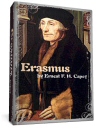
This biography of Erasmus' life and work also contains letters found after the publication of Francis Morgan Nichols' 3-volume Epistles of Erasmus, an in-depth look at the controversy between Erasmus and Luther, two appendixes (one that includes the text of Erasmus' last will), a detailed index, and thirteen illustrations.
Mr. Capey has succeeded in sifting out the essential and interesting elements of the great scholar's career, and has presented them in a way which cannot but appeal to the average men.
—The Auburn Seminary Review
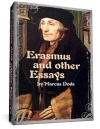
This volume by Marcuse Dods, author of The Parable of Our Lord, includes the following essays:
- Erasmus
- Christian Element in Plato
- Hippolytus's Homily Against Noetus
- Clement of Alexandria and His Apologetic
- Frederick Denison Maurice
- Confucius
- Christianity and Civilization
- On Preaching
- Marcus Aurelius
There is probably not to be found anywhere else, within so narrow a compass, a criticism so true and an estimate so adequate in all respects of Erasmus and his writings, as is contained in the critique which gives the title to this book.
—Scotsman
Marcus Dods (1834–1909) was born in Belford, Northumberland. Dods went on to study divinity and theology at Edinburgh Academy and Edinburgh University, where he graduated in 1854. He is a highly respected scholar, publishing over a dozen books of theology recognized for their expansive critical research.
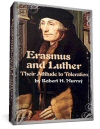
Murray's fascinating work traces with great skill the development in the views of these two sixteenth century figures, their influence upon each other, and the inevitable rupture between them. Contents include:
- The Mature Thoughts of Erasmus
- The Early Thoughts of Luther
- The Rift in the Harmony
- The Excommunication and After
- The Problem of Authority
- The Attitude of Erasmus
- The Free-Will Controversy
- The Peasants' War and the Question of Authority
- The Reform of the Church
- Creed and Council
- Church and State
Erasmus and Luther also includes a detailed bibliography, a Table of Rulers, and an index.
No work on the Reformation published in the English language during recent years approaches in importance Dr. Murray's monumental Erasmus and Luther.
—Contemporary Review, 1920
Robert H. Murray (1874–1947) was a historian of religion and political theory and the author of The History of Political Science from Plato to Present, The King's Crowning, a multi-volume history of Ireland, and more.
Desiderius Erasmus (1466–1536) was a priest, scholar, author, and translator known as a leading figure in the Renaissance humanist movement before and during the Reformation. In 1506 he graduated as Doctor of Divinity from Turin University, and later was Lady Margaret's Professor of Divinity at the University of Cambridge. He then taught at Queens College, Cambridge for five years before becoming an independent scholar. Erasmus' works were very influential; his books were produced in many editions and translations and printed all through Europe during his lifetime.
Reviews
10 ratings

Kevin Bratcher
6/12/2018

Debra W Bouey
5/1/2017

Dan Langston
11/2/2014
Michael Maria Waldstein
12/7/2013

Larry Proffitt (I
11/19/2013

Jerry Peterson
8/15/2013

DMB
8/2/2013

Doug
7/27/2013